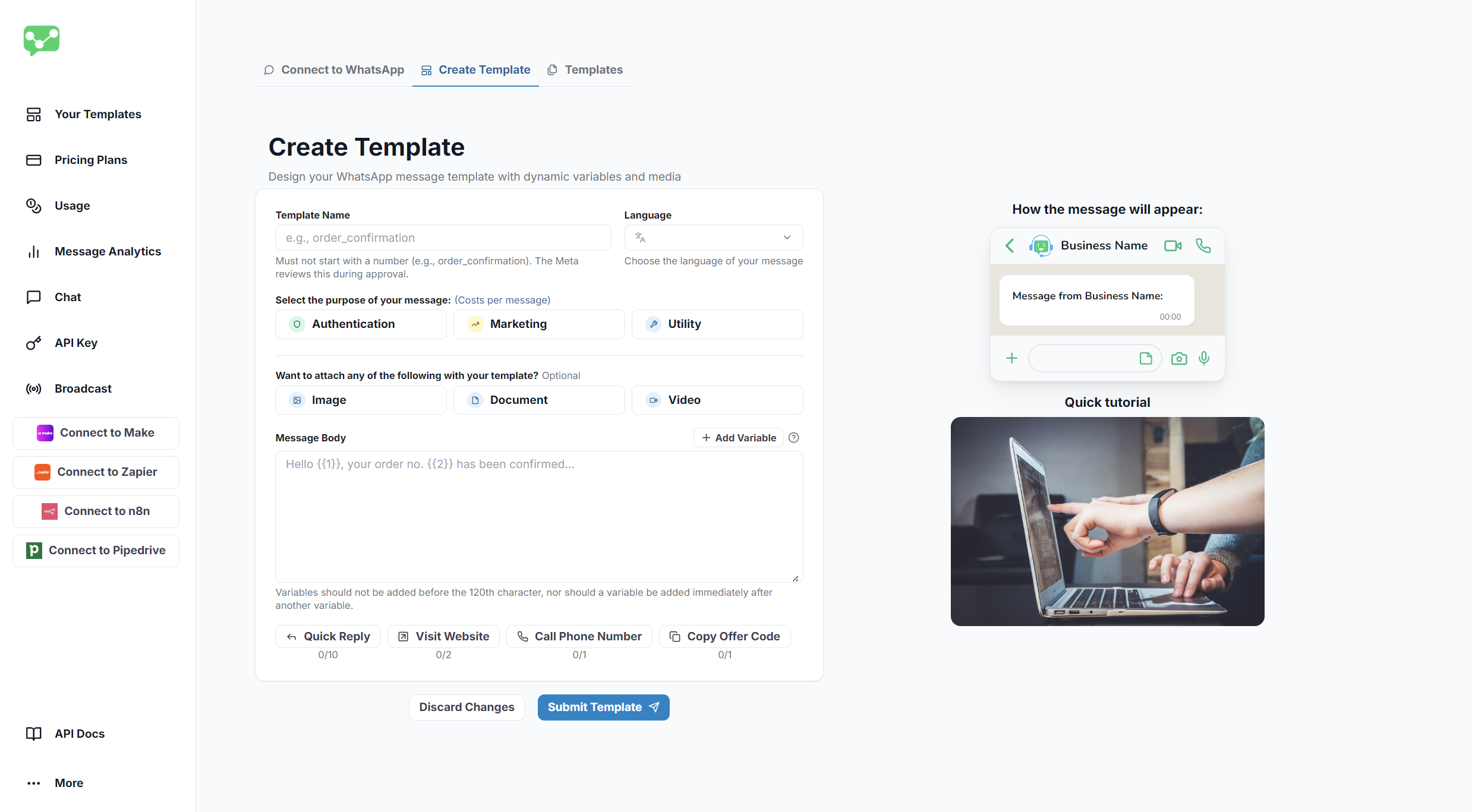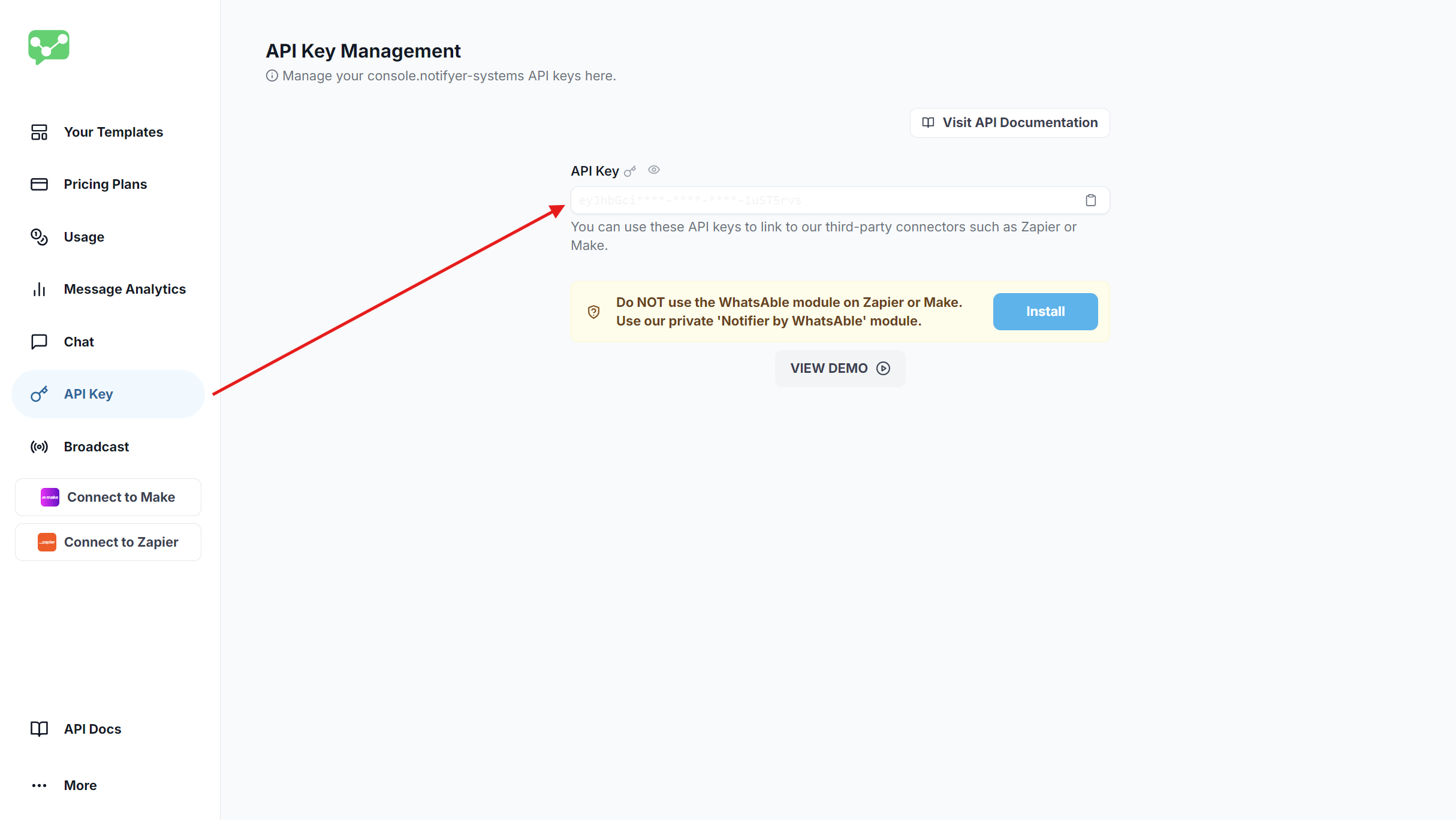Notifyer System Integration with Make This guide walks you through connecting Notifyer System with Make to create powerful automated WhatsApp messaging workflows for your business
Prerequisites Before getting started, make sure you have:
Notifyer System Account Active Notifyer System account with a subscription plan (Monthly or Pay-as-you-go)
Make Account Access to Make workflow automation platform Setting up your Notifyer System account
Complete the Embedding Process
Before sending WhatsApp messages, you must complete the platform embedding process, which connects your WhatsApp Business account to Notifyer System. The embedding process is required by Meta to ensure proper business verification and compliance with WhatsApp Business Platform policies.
Set up message templates
Notifyer System provides two methods for sending WhatsApp messages:
Option A: Template messages
WhatsApp templates are pre-approved message formats that allow for personalization while maintaining compliance with WhatsApp policies.
Navigate to Templates
Go to Your Templates in your Notifyer dashboard
Create Template
Click the Create Template tab at the top of the page
Fill out the form
Complete the template creation form with the following details: Choose a descriptive name for internal reference
Choose your template’s primary language
Select the appropriate message category
Optional: Add an image, document, or video header
Craft your message content
Add placeholders using {{1}}, {{2}} format for personalization
Optional: Configure call-to-action buttons
Submit for review
Click Preview and Submit
Templates typically get reviewed within 24 hours. Creating compliant templates that avoid promotional language increases approval chances.
Option B: Non-template messages
For simpler communications, you can send non-template messages that include:
Text Plain text messages within the 24-hour window
Images Photos and graphics in supported formats
Documents PDFs, Word docs, and other file types
Videos MP4 and other supported video formats
Non-template messages can only be sent within the 24-hour customer service window after a customer initiates contact with your business.
Get your API key
To connect Notifyer System with Make, you’ll need an API key:
In your Notifyer dashboard, navigate to API Keys
Copy your unique API key
Store it securely—you’ll need it for the integration
Never share your API key publicly or commit it to version control systems.
Connect Notifyer System to Make Now that you have Notifyer System set up, let’s connect it to Make to automate your scenarios.
Install Notifyer System in Make
Log in to your Make account
Navigate to Notifyer System dashboard and select Connect to Make in the side menu
Click Continue in the connection guide popup
Click Install , select your organization at the bottom of the screen, then click Install again. (Note: You need Admin, Owner, or App Developer role in your organization to install apps.)
You’re now ready to create scenarios with the Notifyer System app
Set up your Make Scenario
Log in to your Make account
Create a new scenario by clicking + Create a new scenario
(Optional) Add a trigger module of your choice:
Popular triggers include Google Forms, Jotform, ClickUp, or a Schedule trigger
Connect and configure your trigger according to your use case
Add the Notifyer System module
Click the + button to add a new module
Search for Notifyer System in the apps or modules library
Select the module with the official Notifyer System logo
Configure Notifyer System credentials
Once you click on Notifyer System module, select ‘Send a WhatsApp Message with Your Template ’ or ‘Send a WhatsApp Message without Template ’ from the ACTIONS
Click Create a connection in the Connection section of Notifyer System module and you will be prompted to enter your API Key
Enter your Notifyer System API key that you copied earlier
Rename your connection name if needed
Click Save to store your credential
Configure your message
Depending on your messaging needs, choose one of the following operations: Complete the required fields: Enter the recipient’s phone number with country code (e.g., +1234567890) or use dynamic data from previous nodes
Select from your pre-approved templates in the dropdown
Enter publicly accessible media URL for Media (image/video/document) header. This field will only appear if you have a Media (image/video/document) header configured in your selected template.
Fill in values for each variable in your template, mapping them to dynamic data when applicable
Add note for internal tracking. This data won’t be sent to the recipient
Select label(s) for internal tracking. This data won’t be sent to the recipient
Complete the required fields: Enter the recipient’s phone number with country code (e.g., +1234567890) or use dynamic data from previous nodes
Choose from the following message types:
Text Message For plain text messages
Media Message (Image) For sending images (JPEG, PNG, etc.)
Media Message (Video) For sending videos (MP4, 3GP, etc.)
Document Message For sending documents (PDF, Word, etc.)
Audio Message For sending videos (MP3, OGG, etc.)
Interactive URL Button For messages with button that contain URL or dynamic URL
Text Message
Media Message (Image)
Media Message (Video)
Document Message
Audio Message
Interactive URL Button
Message Details
Keep the option at the default ‘No’. If there is a link/URL in the text body and you want the recipient to see a preview, select ‘Yes’
Enter the text message content
Image Details
Enter the publicly accessible URL for your image file
Optional caption for the image
Video Details
Enter the publicly accessible URL for your video file
Optional caption for the video
Document Details
Enter the publicly accessible URL for your document
Optional caption for the document
Enter the filename (e.g., report.pdf)
Document Details
Enter the publicly accessible URL for your audio file (MP3, OGG)
Interactive Message Details
Enter optional text to show at the top
Enter the main content of the message
Enter the text to display on button
Enter the URL for the button
Enter the optional text to show at bottom
Select label(s) for internal tracking. This data won’t be sent to the recipient
Test and activate your scenario
Click Save to save your message configuration
Right click on the WhatsAble module and select Run this module only to verify the module is working correctly
or click Run once in the bottom-left corner of the screen to test the entire scenario
If the test is successful, you’ll see a confirmation message
Click Save icon in the bottom-left corner to save your scenario (You can also set timer intarval for the scenario)
Toggle the Active switch in the bottom-left corner with time to activate your scenario
Example use cases
Order confirmations Send automatic order confirmations when new orders are placed
Appointment reminders Schedule reminders before upcoming appointments
Lead notifications Alert your sales team when new leads come in
Customer support Route support inquiries to the appropriate team member
Delivery updates Keep customers informed about their delivery status
Payment reminders Send automatic payment reminders for overdue accounts
Best practices
Always test your workflows with test phone numbers before activating them for production use.
Whenever possible, use pre-approved templates for better deliverability and compliance.
Include customer names and specific details to increase engagement and response rates.
Ensure all message content complies with WhatsApp Business policies to avoid account restrictions.
Regularly check your message delivery rates in your Notifyer dashboard.
Troubleshooting
Verify API key
Ensure your API key is entered correctly in the Make credentials
Check phone numbers
Confirm phone numbers are in the correct international format (e.g., +14155552671)
Check subscription
Verify your Notifyer subscription is active and has available credits
Template verification
For template messages, ensure you’re using an approved template
Variable check
Verify all required variables are included in your template message
Format verification
Check that variable formats match the expected values (text, number, date, etc.)
Template name
Ensure you’re using the correct template name exactly as it appears in your dashboard
Need help? Our support team is ready to assist you:
For additional automation platform integrations (Make.com, Zapier, etc.), please contact our support team or check our integration documentation.









